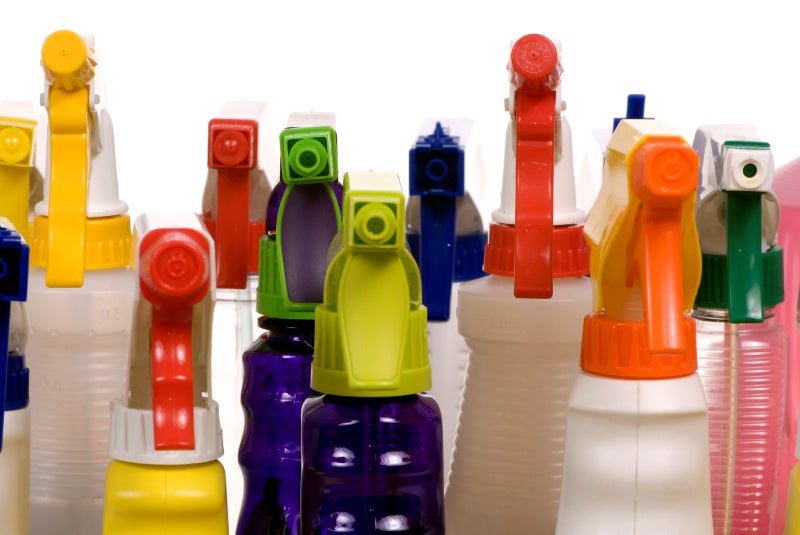Health and Environmental Advocates Petition EPA to Regulate PFAS in Plastic Containers
The petition asks EPA to regulate PFAS created that leach from more than 100 million fluorinated plastic containers into household products and the environment
Contact
A coalition of environmental and health advocates petitioned the Environmental Protection Agency to regulate toxic PFAS found in plastic containers and stored products. Every year, hundreds of millions of plastic containers that store various products — including household cleaning products, fuels, and pesticides — undergo a fluorination process that creates multiple long-chain PFAS, posing risks to consumers, workers, and the environment.
Earthjustice clients, alongside the Center for Environmental Health and Public Employees for Environmental Responsibility, filed the petition under Section 21 of the Toxic Substances Control Act (TSCA), calling on EPA to regulate three toxic PFAS — PFOA, PFNA, and PFDA — produced when plastic containers are fluorinated to impart barrier protection. Earthjustice represents Alaska Community Action on Toxics, Clean Cape Fear, Clean Water Action, Delaware Riverkeeper, and Merrimack Citizens for Clean Water.
“Every day, people are exposed to highly toxic PFAS that leach from plastic containers into widely used products and enter the environment. EPA has already found that multiple PFAS produced during plastic fluorination present an unreasonable risk, and EPA has a legal obligation to eliminate those risks,” said Earthjustice Attorney Kelly Lester. “EPA must use its authority under TSCA to halt the production of these toxic substances, and it must do so quickly: Each day of inaction allows more toxic PFAS to enter the environment and our bodies, posing long-term health risks and putting our communities at risk.”
In December 2023, the EPA issued orders to a major manufacturer of fluorinated plastic containers, Inhance Technologies LLC, directing Inhance not to produce these and other PFAS when it fluorinates containers. These containers store various products — including household cleaning products, pesticides, and fuel — and the PFAS produced during fluorination leach from the containers into the products stored in them. Inhance challenged these orders in court, and a court ruled that EPA did not have authority under Section 5 of TSCA to regulate this production of PFAS as a “new” use. Today’s Section 21 petition seeks regulation of these PFAS under Section 6 of TSCA, which concerns existing uses.
PFAS is a toxic chemical class that poses significant health and environmental risks. Many PFAS — including PFOA, PFNA, and PFDA — persist in the environment, accumulate in people, and are linked to a host of adverse health effects even at very low levels of exposure.
Quote from clients:
“For too long, the EPA has allowed companies using PFAS to commit business-related human rights abuses,” said Clean Cape Fear Co-Founder Emily Donovan. “The EPA must work urgently to protect our right to a healthy and safe environment. We need the EPA to regulate PFAS as a class and make responsible parties pay for the cleanup.”
“EPA needs to use all available authority to keep PFAS chemicals out of the environment, including our drinking water sources,” said Clean Water Action National Campaigns Director Lynn Thorp. “These toxic substances, leaching from millions of plastic containers, pose public health risks in drinking water and increase costs for communities and consumers. Immediate action must be taken to reduce their use and to curtail all exposure pathways.”
“Our mission has always been clear: ensure our waters are safe and clean, and this petition will help us achieve that,” said Merrimack Citizens for Clean Water Co-Founder Laurene Allen. “We must combat the threat of PFAS chemicals, and our voices, together, highlight the urgency of this issue. EPA should act to safeguard our health, our water, and our right to a pollution-free environment for generations to come.”
“PFAS contamination poses a public health crisis to our communities, and this is one step the EPA can take to protect us from irreversible harm,” said Alaska Community Action on Toxics Founder and Executive Director Pamela Miller. “This petition supports our commitment to environmental justice, which drives us to confront the industrial and military contamination legacies that threaten our lands, waters, and air. PFAS threatens our food security and health. The EPA should act quickly and prevent people from the harm PFAS exposure causes.”
“EPA must use its regulatory powers to stop the release of PFAS into our environment through all the pathways that are allowing these highly toxic Forever Chemicals to saturate our world,” said Tracy Carluccio, Deputy Director of Delaware Riverkeeper Network. People are unaware that PFAS are leaching into the food they eat and products they consume, increasing their risk of suffering linked diseases; that is unjust and requires EPA action.”

Additional Resources
About Earthjustice
Earthjustice is the premier nonprofit environmental law organization. We wield the power of law and the strength of partnership to protect people's health, to preserve magnificent places and wildlife, to advance clean energy, and to combat climate change. We are here because the earth needs a good lawyer.